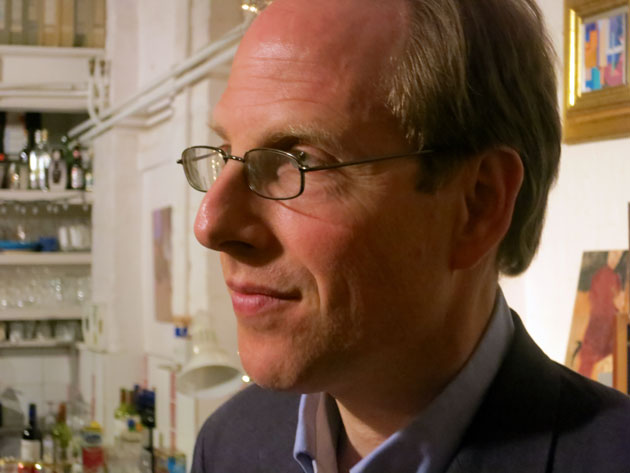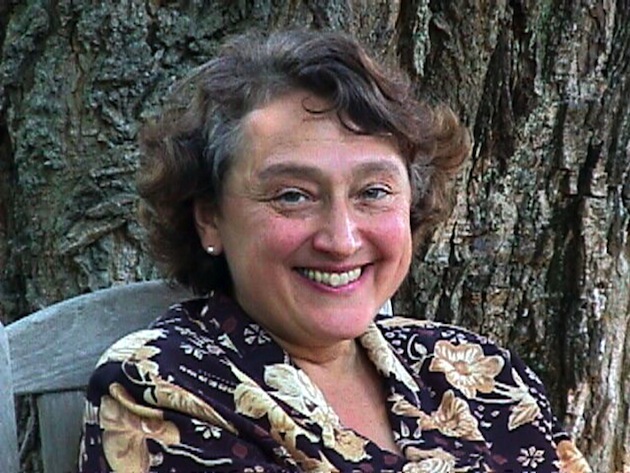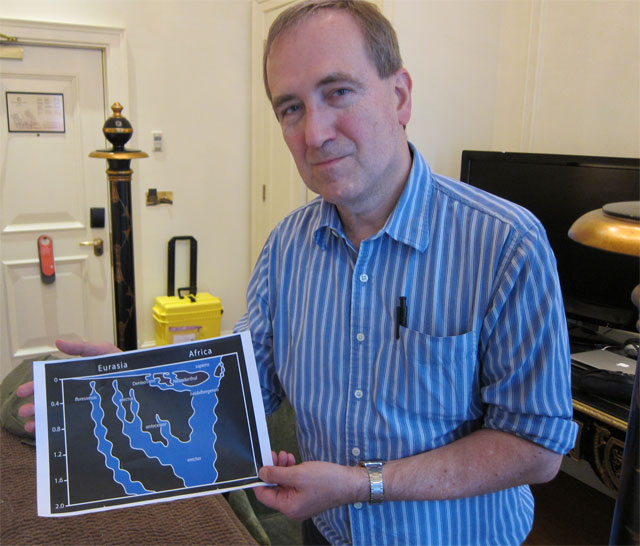Introduction
By John Brockman
Biologist Lynn Margulis died on November 22nd. She stood out from her colleagues in that she would have extended evolutionary studies nearly four billion years back in time. Her major work was in cell evolution, in which the great event was the appearance of the eukaryotic, or nucleated, cell — the cell upon which all larger life-forms are based. Nearly forty-five years ago, she argued for its symbiotic origin: that it arose by associations of different kinds of bacteria. Her ideas were generally either ignored or ridiculed when she first proposed them; symbiosis in cell evolution is now considered one of the great scientific breakthroughs.
Margulis was also a champion of the Gaia hypothesis, an idea developed in the 1970s by the free lance British atmospheric chemist James E. Lovelock. The Gaia hypothesis states that the atmosphere and surface sediments of the planet Earth form a self- regulating physiological system — Earth's surface is alive. The strong version of the hypothesis, which has been widely criticized by the biological establishment, holds that the earth itself is a self-regulating organism; Margulis subscribed to a weaker version, seeing the planet as an integrated self- regulating ecosystem. She was criticized for succumbing to what George Williams called the "God-is good" syndrome, as evidenced by her adoption of metaphors of symbiosis in nature. She was, in turn, an outspoken critic of mainstream evolutionary biologists for what she saw as a failure to adequately consider the importance of chemistry and microbiology in evolution.
I first met her in 1995 when I interviewed her for my book The Third Culture: Beyond the Scientific Revolution (1995). Below, in remembrance, please see her chapter, "Gaia is a Tough Bitch". One of the compelling features of The Third Culture was that I invited each of the participants to comment about the others. In this regard, the end of the following chapter has comments on Margulis and her work by Daniel C. Dennett, the late George C. Williams, W. Daniel Hillis, Lee Smolin, Marvin Minsky, Richard Dawkins, and the late Francisco Varela. Interesting stuff.
As I wrote in the introduction to the first part of the book (Part I: The Evolutionary Idea): "The principal debates are concerned with the mechanism of speciation; whether natural selection operates at the level of the gene, the organism, or the species, or all three; and also with the relative importance of other factors, such as natural catastrophes." These very public debates were concerned with ideas represented by George C. Williams and Richard Dawkins on one side and Stephen Jay Gould and Niles Eldredge on the other side. Not for Lynn Margulis. All the above scientists were wrong because evolutionary studies needed to begin four billion years back in time. And she was not shy about expressing her opinions. Her in-your-face, take-no-prisoners stance was pugnacious and tenacious. She was impossible. She was wonderful.
THE EDGE CONVERSATION:
Ed Regis
Science writer; Author, What Is Life?
The best epitaph for Lynn Margulis probably consists of her own words, from a Discover magazine Q&A with her, published earlier this year:
Q: Do you ever get tired of being called controversial?
A: I don’t consider my ideas controversial. I consider them right.
George Dyson
Science Historian, Author, Darwin Among the Machines; Turing's Cathedral (forthcoming)
Lynn Margulis did much of the hard work (preceded by some heretic Russians, and the even more heretic Samuel Butler) of opening the doorway I was able to walk through with "Darwin Among the Machines". She titled her review in the "Times Higher Education Supplement" (14 August 1998) "Perfection in Grenade Throwing," a reference not only to Samuel Butler's long-running critique of Charles Darwinism, but to William Calvin's theory of mental evolution through sequence-buffering for stone-throwing, and certain lingering repercussions of the trench warfare that dominated World War I. Lynn Margulis was herself among the elite of scientific grenade throwers, and long-entrenched positions shifted when she scored a hit.
Nicholas Pritzker
Chairman of the Board and CEO of the Hyatt Development Corporation
In my teen-age years, my science side danced with my fascination with metaphysical concepts. was amazed by the discovery of the CMB, but equally so in trying to find connection between Beckett's novels, Magritte's surrealism, symbolic logic and the Rinzai Zen koan: the basis of my undergraduate thesis in 1969. At the time, I thought of Gaia as a mystical concept (the "god is good" idea). Later, as science decisively won the race for my attention, I was startled to learn that at least some of the Gaia thinkers, especially Margulis, were working with scientifically valid theories but within a novel conceptual context. This approach lends itself to misinterpretation, but seems to me worth the risk!
Jerry Coyne
Professor, Department of Ecology and Evolution, University of Chicago; author, Why Evolution is True
Lynn Margulis did indeed have a clever—and correct—idea that revolutionized our view of how life evolved, but later became a victim of the Big Idea Syndrome, thinking that because she was right about organelles, she was right about everything else. That led her to make repeated and completely unfounded attacks on evolutionary biology in the last decade, embarrassing herself with her pronouncements. Her legacy is a good one, but not unmixed.
Rereading her chapter "Gaia is a Tough Bitch" only reinforces my opinion about her misguided criticisms of neo-Darwinian evolution and her unwarranted antipathy toward population genetics. Not only did she fail to comprehend how population genetics has advanced our understanding of nature—the effects of inbreeding and of genetic drift are two such advances—but her views on speciation, a field in which I've worked for three decades, are simply wrong.
Margulis's idea that new species originate from symbiosis has no empirical support. When we try to understand the genetic underpinnings of new species, we find that, with the exception of polyploidy in plants, it always maps to changes in the DNA. That is, the splitting of lineages, like evolution within a lineage itself, is almost always the result of gradual, gene-by-gene change. We have no evidence that symbiosis has been responsible for even a single case of speciation.
All of us should honor Margulis's real contributions to biology: her recognition and working out of earlier suggestions that some cellular organelles were acquired by symbiosis, and that the ancestors of these organelles were bacteria. This was a tremendous advance, achieved in the teeth of substantial doubt. Sadly, Margulis's success in the face of such criticism seems to have made her stubborn and dogmatic about her other biological views. And, even sadder, those theories were often wrong. She strongly denied, for example, that AIDS was caused by the HIV virus, or that the HIV virus even existed. AIDS, she maintained, was simply syphilis, with the spirochete rendered undetectable because it formed a symbiosis with human cells. How does one balance her positive contributions against such a deadly form of denialism?
We should always honor those scientists who have advanced our understanding of nature in ways as profound as Margulis. But let us also remember that being right about one big matter does not render us immune to error in other matters, and that scientific fame does not give us a free pass for all of our ideas.
LYNN MARGULIS was Distinguished University Professor in the Department of Geology at the University of Massachusetts, Amherst. She was the author of Symbiotic Planet, The Origin of Eukaryotic Cells, Early Life, and Symbiosis in Cell Evolution. She was also the coauthor, with Karlene V. Schwartz, of Five Kingdoms: An Illustrated Guide to the Phyla of Life on Earth and with Dorion Sagan of Acquiring Genomes, Microcosmos, Origins Of Sex, and Mystery Dance.
Lynn Margulis 1938-2011
"Gaia Is A Tough Bitch"
[From The Third Culture: Beyond the Scientific Revolution (1995). Paperback: Amazon | B&N; Edge Online Edition
Richard Dawkins: I greatly admire Lynn Margulis's sheer courage and stamina in sticking by the endosymbiosis theory, and carrying it through from being an unorthodoxy to an orthodoxy. I'm referring to the theory that the eukaryotic cell is a symbiotic union of primitive prokaryotic cells. This is one of the great achievements of twentieth-century evolutionary biology, and I greatly admire her for it.
[LYNN MARGULIS]: At any fine museum of natural history — say, in New York, Cleveland, or Paris — the visitor will find a hall of ancient life, a display of evolution that begins with the trilobite fossils and passes by giant nautiloids, dinosaurs, cave bears, and other extinct animals fascinating to children. Evolutionists have been preoccupied with the history of animal life in the last five hundred million years. But we now know that life itself evolved much earlier than that. The fossil record begins nearly four thousand million years ago! Until the 1960s, scientists ignored fossil evidence for the evolution of life, because it was uninterpretable.
I work in evolutionary biology, but with cells and microorganisms. Richard Dawkins, John Maynard Smith, George Williams, Richard Lewontin, Niles Eldredge, and Stephen Jay Gould all come out of the zoological tradition, which suggests to me that, in the words of our colleague Simon Robson, they deal with a data set some three billion years out of date. Eldredge and Gould and their many colleagues tend to codify an incredible ignorance of where the real action is in evolution, as they limit the domain of interest to animals — including, of course, people. All very interesting, but animals are very tardy on the evolutionary scene, and they give us little real insight into the major sources of evolution's creativity. It's as if you wrote a four-volume tome supposedly on world history but beginning in the year 1800 at Fort Dearborn and the founding of Chicago. You might be entirely correct about the nineteenth-century transformation of Fort Dearborn into a thriving lakeside metropolis, but it would hardly be world history.




